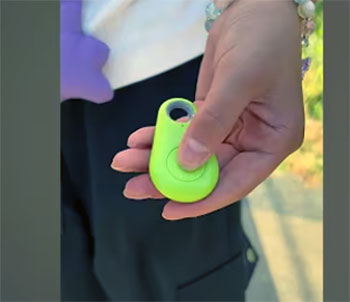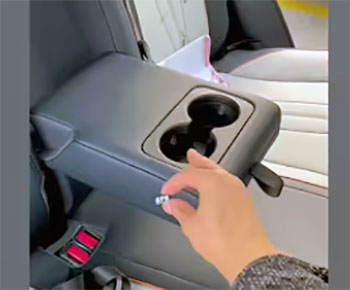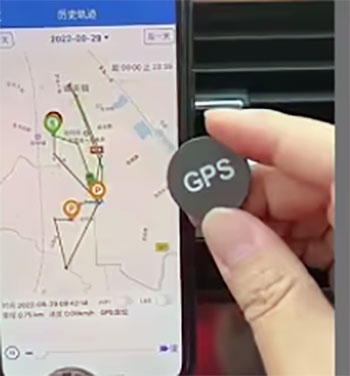As someone who’s always misplacing keys or forgetting where I left my backpack, I decided to try out the Ciao wireless tracker tags. These affordable little devices promised to make tracking my stuff easier through Bluetooth connectivity and a simple app.
In this review, I’ll share my experiences as a regular user, analyzing what works and, more importantly, what doesn’t. My goal is to give you a clear picture so you can decide if they’re worth your time and money, especially since I encountered several frustrations along the way.
Common Problems I’ve Encountered With Ciao Tracker Tags
Here are the main issues that stood out during my testing and daily use:
- Limited Bluetooth Range and Connectivity Drops
- Shorter-Than-Expected Battery Life
- Unreliable App Performance and Interface Glitches
- Compatibility Hurdles Across Devices
- Absence of Advanced Tracking Features
- Questionable Build Quality and Durability
- Privacy and Stalking Concerns
- Weak Sound Alerts for Locating Items
- Delays in Location Updates
- Poor Customer Support and Warranty Experiences
Limited Bluetooth Range And Connectivity Drops

I attached one of these Ciao tags to my keychain right away, expecting it to keep tabs on my keys no matter where I wandered in the house. But reality hit quick.
The advertised range is about 100 to 150 feet, but in practice, it’s much less reliable.
Walls, furniture, or even a thick door can cut that down to 50 feet or so.
One time, I was in the backyard, and the tag on my wallet inside the kitchen just dropped off the map.
I had to walk back in to reconnect.
This isn’t just annoying; it’s a core flaw for a tracker meant to prevent losses. Bluetooth tech has its limits, and Ciao doesn’t seem to optimize it well. Compared to pricier options, where the signal holds stronger, these feel basic.
If you’re in a multi-story home or a busy office, expect frequent disconnects. I found myself double-checking the app constantly, which defeats the purpose of set-it-and-forget-it convenience.
From my tests, outdoors it’s a bit better, maybe up to 200 feet in open space, but interference from other devices or crowds messes it up. Imagine being at a park and losing signal because of nearby phones. It’s frustrating when you need it most, like searching for a bag in a crowded area. Overall, this limitation makes the tags feel more like a novelty than a dependable tool.
Shorter-Than-Expected Battery Life
The packaging boasts up to a year of battery life, which sounded great for something so small. But after a couple of months, one of my tags started showing low battery warnings.
I use them daily, sure, but not excessively—just the occasional ping to find my stuff. The replaceable coin cell battery is a plus, but replacing it every few months adds up in cost and hassle.
I suspect the constant Bluetooth scanning drains it faster than advertised, especially if the app is running in the background. In my experience, leaving the separation alerts on accelerated the drain.
One tag died completely during a weekend trip, leaving me without tracking for my luggage. It’s not catastrophic, but it erodes trust. If you’re forgetful about checking battery levels, like I can be, you’ll end up with dead tags at the worst times.
Compared to other trackers I’ve tried, Ciao’s batteries seem cheaper quality, leading to inconsistent performance. Some users report even shorter lifespans in cold weather or high-humidity areas. It’s a small issue that snowballs into bigger reliability problems over time.
Also read:My Final Thoughts Revian Hair Cap
Unreliable App Performance And Interface Glitches
The iSearching app is supposed to be the brain behind these tags, but it’s more like a headache. Setup was straightforward at first—download, pair via Bluetooth, done. But then the glitches started. The map view lags, sometimes freezing when I try to locate a tag. One evening, I couldn’t get the app to refresh the location, even though my phone was connected.
The interface feels clunky, with buttons that don’t respond right away and notifications that arrive late. I missed a separation alert once because the push notification didn’t pop up until hours later. As a user who relies on quick feedback, this is maddening. The app also crashes occasionally on my Android phone, forcing me to restart it.
Updates seem rare, so bugs linger. I appreciate the basic features like renaming tags or sharing locations, but the execution falls short. If you’re tech-savvy, you might workaround it, but for everyday folks, it’s a barrier. This unreliability turned what should be a simple tool into a source of frustration.
Compatibility Hurdles Across Devices

Ciao claims compatibility with both iOS and Android, which drew me in since I switch phones sometimes.
But it’s not seamless. On iOS, it integrates okay with the Find My app knockoff features, but on Android, I ran into pairing issues.
One tag wouldn’t connect properly to my older Android tablet, showing “device not supported” errors.
The app requires specific Bluetooth versions, and if your phone is a bit dated, you’re out of luck.
I tested on a friend’s iPhone, and it worked better, but alerts were inconsistent. No support for Windows or other platforms limits versatility. If you have a mixed-device household, expect headaches.
This isn’t unique to Ciao, but as a budget option, it feels skimped on testing. I ended up using it mostly on one phone, defeating the multi-device promise. It’s a reminder that cheap doesn’t always mean accessible.
Absence Of Advanced Tracking Features
These tags stick to basics: Bluetooth pinging and alerts. No GPS means if something’s out of range, you’re relying on the last known location, which isn’t helpful for real losses. I lost a bag once, and the tag showed it at home when it was actually in a cab. No ultra-wideband for precise finding, either—no arrow guiding you right to it.
Crowd-sourced finding? Minimal, since the network isn’t as vast as bigger brands. In rural areas, it’s useless. I missed features like reverse ringing my phone from the tag or integration with smart home systems. It’s fine for home use, but for travel or valuables, it falls short.
This gap makes Ciao feel outdated. If you need robust tracking, look elsewhere. It’s like having a basic phone in a smartphone world—functional, but limited.
Questionable Build Quality And Durability
Out of the box, the tags look sleek and compact, easy to attach. But after a few drops, one developed a crack. The plastic feels cheap, not rugged like competitors. Water resistance is claimed, but I wouldn’t trust it in rain; one got wet and glitched afterward.
The keyring hole is flimsy—mine widened after attaching to keys, risking detachment. For pet collars or bags, durability is key, but these seem prone to wear. In my daily carry, they scratched easily, looking worn quickly.
Budget materials explain the low price, but longevity suffers. If you’re rough on gear, these won’t last. It’s a trade-off I regretted.
Privacy And Stalking Concerns
Trackers raise privacy flags, and Ciao isn’t immune. The app tracks locations, but security feels lax—no strong encryption mentions. I worried about data sharing or hacks. Stalking risks exist; someone could slip a tag in your bag without alerts like premium models have.
No anti-stalking features mean unknown tags might follow you undetected. I tested by hiding one; the app didn’t flag it as foreign. In a world of misuse reports, this oversight is concerning.
As a user, it made me paranoid. Better brands have safeguards; Ciao lags here.
Weak Sound Alerts For Locating Items
The built-in speaker is supposed to beep loudly, but it’s disappointingly quiet. In a noisy room, I could barely hear it from 10 feet. One time, under couch cushions, it was inaudible until I was right on top.
Volume maxes low, and no customization. Compared to louder rivals, it’s inadequate. For quick finds, sound is crucial; this fails.
It’s a simple fix missed, highlighting cost-cutting.
Also read:My Final Thoughts Revian Hair Cap
Delays In Location Updates
Updates aren’t real-time; there’s a 5-10 minute lag sometimes. During a walk, the tag showed my keys at home long after leaving. In fast scenarios like theft, this delay is useless.
Bluetooth reliance causes this, without network boosts. In tests, urban areas were better, but suburbs lagged.
It’s unreliable for dynamic situations, limiting utility.
Poor Customer Support And Warranty Experiences
When a tag failed, contacting support was tough. Emails went unanswered for days, and no phone line. The warranty is one year, but claiming it involved hoops.
Online forums show similar complaints—slow responses, denied claims. As a user, it left me stranded.
Better support would help, but it’s lacking.
Frequently Asked Questions (FAQ)
Typically 100-150 feet, but it varies with obstacles and can drop significantly indoors.
Yes, but performance is better on iOS, with some Android devices facing pairing issues.
Typically 100-150 feet, but it varies with obstacles and can drop significantly indoors.
Conclusion

Looking back on my time with the Ciao wireless tracker tags, I’ve learned they’re a mixed bag—affordable and basic, but riddled with shortcomings that can turn convenience into frustration.
As someone who’s tested them thoroughly, I see their appeal for casual, home-based tracking, but the problems outweigh the perks for serious use.
You might find them handy for low-stakes items, but if reliability matters to you, consider investing in something sturdier.
What about you? Have you tried similar trackers, and did you run into the same issues? I’d love to hear your thoughts and maybe swap tips on better alternatives.
In the end, choosing the right tracker boils down to your needs, and I hope this helps you make a smarter call.
